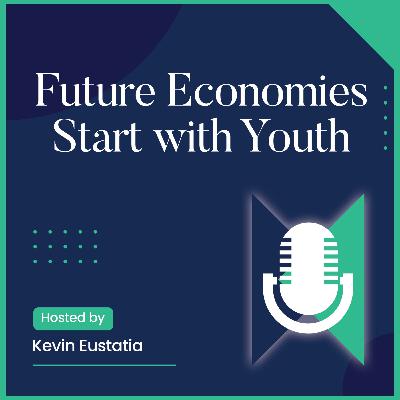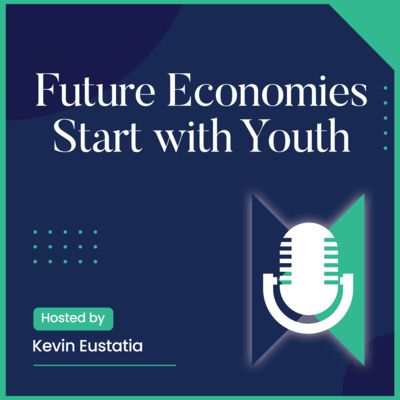Discover Future Economies Start with Youth
Future Economies Start with Youth

Future Economies Start with Youth
Author: CFYE
Subscribed: 0Played: 5Subscribe
Share
© CFYE
Description
Youth employment conversations are multi-faceted and complex. That is why, we have created a new space to explore the richness of these topics: our Future Economies Start with Youth podcast.
Through this initiative, we aim to highlight youth perspectives and dive deep into the structural roadblocks in youth employment. What are the challenges youth face when looking for a job? What are their personal stories? How can companies work with youth to navigate employment barriers?
Through this initiative, we aim to highlight youth perspectives and dive deep into the structural roadblocks in youth employment. What are the challenges youth face when looking for a job? What are their personal stories? How can companies work with youth to navigate employment barriers?
18 Episodes
Reverse
In today’s rapidly evolving job market, education alone is no longer enough. A 2022 UNICEF report revealed that nearly 75% of young people aged 15-24 in 92 countries lack the critical skills needed for modern employment. So, how do we bridge this growing gap?In this episode of 'Future Economies Start with Youth' - The Podcast, our host Kevin Eustatia, sits down with Paul Njuguna, CFYE's Senior Portfolio Associate for Kenya, to explore the impact of the skills mismatch on young people and economic growth, particularly in Kenya, while highlighting key partners in CFYE's Kenyan portfolio that help bridge this gap. Emily Waters, CFYE's MEL Manager, discusses how data-driven, youth-centered training programs are transforming lives by aligning skills with market demands. She dives into the role of gender, accessibility, and feedback loops in shaping effective programs, with real-world examples of how listening to young people—especially marginalized groups—leads to meaningful change. From VR welding in Kenya to innovative hospitality training in Egypt, this episode highlights practical solutions and success stories that are redefining how we prepare the next generation for the workforce.
In this episode, our host Kevin Eustatia Palm is joined by Sinead Magill, Co-CEO of the Palladium Group, and Dirk-Jan Koch, Director & Secretary of the Advisory Council of International Affairs of the Netherlands (AIV). Together, they explore the roles of development organizations and donor countries in fragile contexts, discussing the risks and opportunities in overcoming conflict and challenging the conventional definition of post-conflict period. The episode delves into the significance of post-conflict stabilisation programs, sustainable economic growth, and the role of private sector development in achieving lasting peace, highlighting the importance of implementing inclusive development agendas that prioritise the inclusion of local communities and young voices.
In today’s episode of the Future Economies Start with Youth
podcast, Kevin invites CFYE Country Leads, Ola Farrag, Lina Al Khawaja, and Andrew Magunda to discuss how localisation is reshaping international development and empowering communities to drive their own progress.
We will hear about the importance of putting local voices and youth at the forefront, not only for creating relevant, impactful solutions, but for fostering resilience and long-term sustainability. In addition, Ola, Lina and Andrew will shine light to how CFYE’s tailored approach leverages local knowledge and partnerships to create lasting change for youth employment.
With 80 million African youths trapped in extreme poverty and a significant disparity between job seekers (10 to 12 million) and available opportunities (only 3 million), unemployment pressures are overwhelming. Various challenges exacerbate this situation, including skills gaps, gender disparities, and a heavy reliance on the informal economy, where work is often insecure and vulnerable. Faced with such large numbers of disenfranchised and unemployed youth, the need for scalable solutions becomes paramount. In this episode, host Kevin Eustatia and guests Ahmed Darwish, Adekemi Ajayi, Bowofade Elegbede, and
Osagie Azeta explore the Scalable Employment Model's potential to reshape Africa's economic landscape, diving into CFYE's SEM Call and highlighting the impactful work of Acumen and initiatives like CropSafe.
In this episode, host Kevin Eustatia and guests Niek van Dijk, Andy Bownds, and Anouk Verheijen explore the world of social impact and financial sustainability through the lens of investment readiness. Together, they uncover the challenges and opportunities faced by social businesses in attracting
investment to amplify their impact. From navigating grant funding to leveraging innovative financial structures, they share invaluable strategies and insights that can propel social enterprises to enhanced financial sustainability and
greater societal impact.
In this episode, our host Kevin Eustatia Palm facilitated an insightful discussion on the potential of the plastic waste recycling sector to create green jobs for youth. Drawing upon the insights of the collaborative research conducted by The Include Knowledge platform and CFYE, the speakers Camee van Knippenberg, Brian Sagala and Rikke van der Veen explored the topic, respectively, from a youth, business and research perspective. Their discussions delved into the possibilities that this sector has to create green jobs and empower new generations of climate champions, while touching upon the current challenges to a sector-wide job improvement and formalisation. Their conclusion? Effective change hinges on a collaborative approach involving government, businesses, and workers.
In episode 12, "Equity Through Entrepreneurship" of Future Economies Start with Youth – The Podcast, host Kevin Eustatia takes a deep dive into entrepreneurship and how it can pave the way for equitable access to decent work. Featuring insights from CFYE Country Leads for Morocco Farah Fawzi and Senegal, Aminata Diouf, the discussion uncovers the complexities of gender disparities within the informal sector and the strides being made towards inclusivity. Furthermore, an enlightening interview with Fatou Diop, founder of Calinounou, sheds light on the transformative potential of entrepreneurial ventures, particularly in formalizing the housekeeping sector. Amidst challenges like informality and skill gaps, entrepreneurship offers a beacon of hope for youth employment. Through a multilateral approach involving government, private sector, and educational institutions, the episode envisions a future where entrepreneurship thrives as a catalyst for equitable and sustainable employment. Join us as we explore the dynamic intersection of entrepreneurship, youth empowerment, and equity, envisioning a future where opportunity knows no bounds.
In this episode, titled “The Power of Social Businesses”, our guest speakers Abdissa Tegene, CFYE Country Lead for Ethiopia, Irene Sleven, co-director of VSO Netherlands, and Feven Tsehaye, founder and CEO of Tchakka Origins, engaged in an insightful discussion on the value of social enterprises. Join them as they unravel the inner workings of businesses with a strong social focus, how they operate, and dive into the benefits that arise from intertwining social responsibility with economic prosperity for greater social impact.
Political and economic uncertainty, conflict and insecurity have negative impacts on entire populations. However, these affect vulnerable groups – such as youth and women – in a disproportionate manner. In fragile contexts, their already precarious social and economic situation gets exacerbated by sudden shocks in the labour market, leaving them with fewer and poorer job opportunities.
In this episode, our guest speakers Ahmed Darwish, our Country Lead for Sudan, Safia Elfadni from Alsalam Factory and Jonathan Moss, expert on conflict and stabilisation, discussed the significance of development programs in fragile contexts and how they can be designed to be sustainable also in the long term.
Local ownership, focus on vulnerable groups like youth and women, and going beyond financial support were just some of the examples of good practices that our speakers brought up. Listen or watch the full episode to know more!
In the 9th episode of Future Economies Start with Youth, we will explore the opportunities and limitations of green policies in the business sphere. Business support is absolutely essential to achieving a net-zero future, but how can we effectively translate environmental policies into our business settings? To answer this question, three experts who offer key insights into the theory and practicality of green policy implementation will join us from an international business perspective.
While many organizations strive to establish youth-focused policies, they often overlook a critical tool to enhance meaningful youth participation. By establishing a Young Employee Network (YEN), companies can create a supportive environment for employees to openly share their concerns with their peers, network, and build a community, based on shared experiences and interests. In this episode, we will explore young employee networks' power in retaining youth from a theoretical and practical perspective.
Despite progress made in recent years, gender barriers still hinder young women from fully engaging in the workforce. Addressing these barriers is a crucial component of achieving gender equality, but true equality extends beyond simply creating job opportunities for women. We must also cultivate gender-inclusive conditions that empower women to pursue their aspirations and advance into leadership roles.
In this podcast episode, we had the honor of hosting four outstanding guests - Rosanna Duncan, Felicity Sibindi, Jennifer Ndegwa, and Nabihah Rishad. They delve deep into the structural barriers that young women face and share their valuable insights on how to establish inclusive conditions for women in the workforce.
In this episode, our host Kevin and a group of experts will be discussing the topic of Green Jobs. The three experts joining us will shed light on what green jobs truly mean in various sectors and country contexts. They will also discuss the necessary skill sets for excelling in these jobs, the practical framework for measuring green jobs, and how to adequately prepare young people for green jobs.
Link from Episode: https://fundforyouthemployment.nl/wp-content/uploads/2022/10/Green-Jobs-For-Youth-in-Africa.pdf
Digital work is rising globally. Technological developments introduce new trends and opportunities in the labour market while making certain jobs obsolete. The shifts technology initiates lay the foundation for a new future of work – a digital future.
In this episode, we dive deep into the concept of digital transition and jobtech and explore its impact on making work accessible and inclusive. The episode also illustrates the tangible positive outcomes some businesses created for African youth through technology.
For more information, go to: https://fundforyouthemployment.nl/wp-content/uploads/2022/10/Youth-Led-Research-Kenya.pdf
A Blended Approach to Volunteering
Blended Volunteering is indispensable for ensuring innovative and culturally resonant projects. In this episode, we explore why this approach is so successful in creating decent and sustainable employment for youth.
“This is the time to leave no one behind because we can’t simply afford it anymore. We need all the talent on the labour market.”
What is decent work? What do young people value in employment? What role does a living income play in making a job decent? In this episode, decent work experts and youth underline what decent and meaningful work means and, more importantly, what the risks are of not prioritizing decent work as an employer. The episode explores some practical steps employers can take to provide young people with decent jobs.
Engaging youth is indispensable for creating meaningful jobs for young people; it also adds significant business value, creating a competitive advantage for businesses. In this episode, we uncover how youth participation makes a win-win scenario for young people and private entities and how we can authentically engage with youth to avoid tokenism.
Youth unemployment is growing in Africa. Every year, around 12 million young people enter the labour market, while only 3 million jobs are created. The magnitude of the problem means new innovative approaches become necessary to tackle this issue. This episode outlines how the employment market looks in Kenya and Nigeria, what opportunities the economies create, and how youth’s potential can be a driving force in finding solutions.






